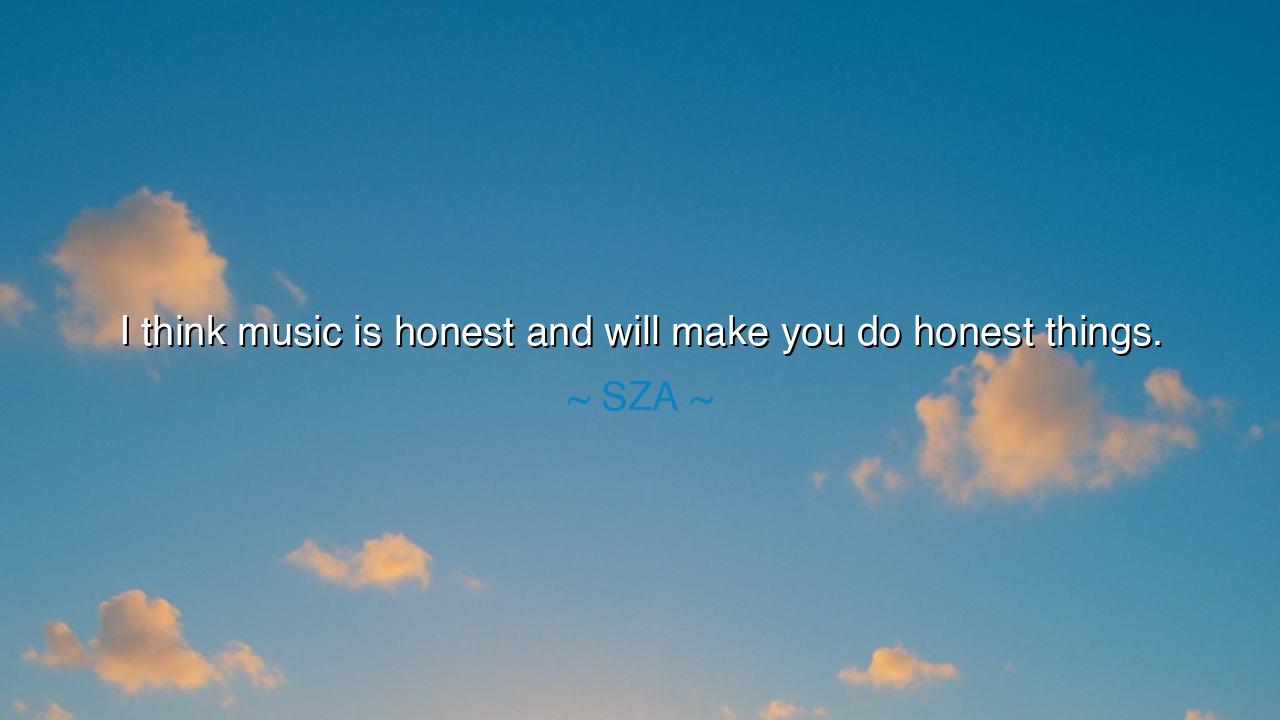
I think music is honest and will make you do honest things.






Hear the voice of SZA, who speaks with clarity born of her craft: “I think music is honest and will make you do honest things.” In this brief saying lies a truth ancient and eternal, for music has always been the mirror of the soul. Where words may falter, where masks may hide the heart, music breaks through with a power that strips away pretense. It is honesty in vibration, truth carried on rhythm, the spirit revealed in sound.
To say that music is honest is to recognize that it cannot lie. A note sung in sorrow trembles with grief; a melody of joy bursts forth with light. Unlike the tongue, which may deceive, the heart within music reveals itself plainly. This is why lovers turn to songs to express what they cannot say, and why mourners find comfort in hymns when speech is powerless. Music does not flatter; it discloses. And in hearing it, men and women are compelled to face their own truths, to do honest things in response.
The ancients understood this well. The Greeks believed that music had moral power, shaping character as surely as laws or teachers. Plato wrote of the modes of music that could stir courage or soften resolve, for they touched not only the ear but the soul itself. In temples and courts, music was used to bring forth honesty before gods and rulers alike. For in the presence of melody, the spirit could not long hide behind falsehood.
History offers us a striking example in the life of Billie Holiday. When she sang “Strange Fruit,” her voice carried not entertainment but revelation. The haunting song, filled with raw truth, confronted a nation with the horrors of racial violence. It was too honest to be ignored, and it compelled listeners to reckon with injustice. In her music, Holiday revealed both her own courage and the dishonesty of a society hiding behind silence. Her music made people do honest things—to look, to feel, to change.
Even in times of war, armies and nations have turned to music. Not merely to stir zeal, but to remind men of what they fight for. A hymn sung before battle did not disguise the fear in their hearts but turned that fear into courage. In this way, music awakened honesty: the acknowledgement of mortality, the confession of hope, the embrace of brotherhood. What no command could compel, a song could inspire.
The lesson of SZA’s words is profound: let music guide you to truth. Do not treat it as background noise but as a voice calling you to be real with yourself and with others. When you feel moved by a song, ask why. When it stirs tears, confess the sorrow it reveals. When it lifts joy, embrace the freedom to rejoice without shame. To walk with music’s honesty is to live without hiding, to let the inner truth flow outward in action.
Practical action is clear: surround yourself with music that uplifts your spirit, challenges your mind, and draws honesty from your heart. Do not flee from the songs that expose your wounds, for they bring healing. Create music of your own, if only in humming or singing, for the act itself is an expression of truth. And when you encounter dishonesty in the world, let music be your reminder that truth still vibrates, that honesty cannot be silenced.
And so, remember the wisdom of SZA: music is honest, and it makes us honest. Let it strip away your masks, let it guide your actions, let it awaken courage where there is fear, and tenderness where there is hardness of heart. For in music we encounter the purest truth, and through it, we are called to live truthfully ourselves.






AAdministratorAdministrator
Welcome, honored guests. Please leave a comment, we will respond soon